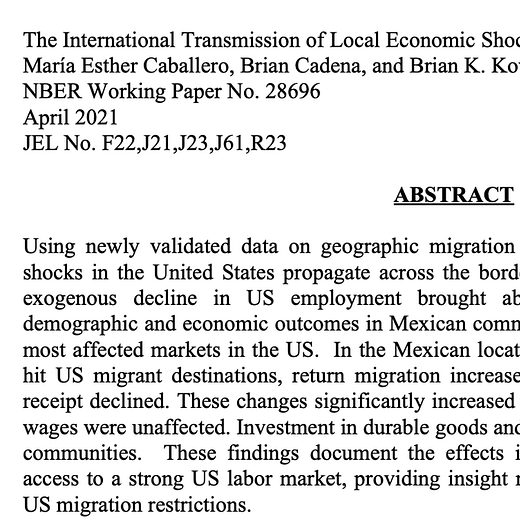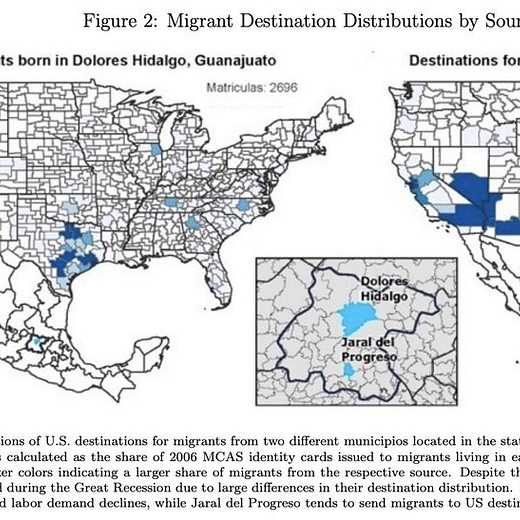Best of #econtwitter - Week of April 25, 2021
Apr 26, 2021
Welcome readers old and new to this week’s edition of Best of Econtwitter. Thanks to those sharing suggestions, over email or on Twitter @just_economics.
Paper summary threads

Lyman Stone 石來民 🦬🦬🦬@lymanstoneky
Being just above/below the cutoff for getting into one's preferred program doesn't impact odds of marrying, but it radically alters odds of marrying someone *in your preferred program*. #NBERday

3:55 PM · Apr 19, 2021
1 Repost · 14 Likes

Lyman Stone 石來民 🦬🦬🦬@lymanstoneky
And what group of people marry each other most!
Lawyers.
lol.
#NBERday

4:02 PM · Apr 19, 2021
6 Reposts · 27 Likes
^“Q: What is college for? A: Getting married”, long thread

Adrien Matray@AdrienMatray
So happy to see this paper published! I quantify the magnitude of innovation spillovers. When a firm (exogenously) produce one new patent, that triggers .2 additional patent in the same area. These spillovers are very local (they basically disappear within a 50 miles radius)

Journal of Financial Economics @J_Fin_Economics
Forthcoming:
The local innovation spillovers of listed firms,
@AdrienMatray, @PrincetonBCF
https://t.co/O0uXP0qwEv
4:15 PM · Apr 22, 2021
6 Reposts · 85 Likes

Gregor Schubert@gregorschub
Migration can transmit shocks across borders! New WP by Caballero, Cadena, and Covak. Clever identification: Mexican municipalities differ in their exposure to U.S. labor markets because of where local migrants to the U.S. ended up working.
bit.ly/3mZItYZ
1/3


8:29 PM · Apr 19, 2021
4 Reposts · 15 Likes

Florian Ederer@florianederer
Think #CommonOwnership can only be bad? Think again!
Here's our new paper that theoretically & empirically studies how common ownership affects corporate innovation.
florianederer.github.io/co_innovation.…
Comments welcome, especially from @SayWhatYouFound who loves cliffhanger titles.

11:02 AM · Apr 21, 2021
18 Reposts · 59 Likes

Aaron Chalfin@ajc730
Thanks to @monicajdeza for presenting her excellent paper (with @JCMecon and @keish_solo) on local access to mental health services and crime in my graduate seminar class. TLDR: More access to mental healthcare, less crime. Paper here: docs.google.com/viewer?a=v&pid… Short thread 👇

6:00 PM · Apr 21, 2021
6 Reposts · 18 Likes

Camilo Acosta Mejía@Cacostam
New working paper alert: The Incidence of Land Use Regulations
(1/13)
5:44 PM · Apr 21, 2021
31 Reposts · 149 Likes
^TLDR: regressive

micah english@micahanglais
Democrats have started using racial justice framing to promote their progressive policies (eg, student debt relief is good b/c it will close the racial wealth gap). Is this language helpful for their causes? In a new working paper with @j_kalla, we find NO osf.io/tdkf3

6:38 PM · Apr 23, 2021
420 Reposts · 2.39K Likes

Charles Fain Lehman@CharlesFLehman
In a study, Harvard MBAs worked in teams to form micro-businesses. When the teams were *randomly* assigned, the most diverse (on race and sex) teams performed the worst. But the effect goes away when students are allowed to pick their own teams.
nber.org/papers/w28684

12:20 PM · Apr 19, 2021
6 Reposts · 38 Likes

Robert Dur@DurRobert
Economics seminars during Covid-19:
🔹the number of seminars ⬇️ by 20%
🔹share of female seminar speakers ⬆️
🔹share of leading economists ⬇️, share of young economists ⬆️
🔹distance between host and speaker institutions ⬆️
by 20%
cep.lse.ac.uk/pubs/download/… by Marcus Biermann

9:46 AM · Apr 19, 2021
62 Reposts · 365 Likes
More: where politicians live; monetary policy uncertainty and trend inflation; IT and returns to scale; loans and monetary shocks; slavery and US economic development; collective bargaining; Twitter political influence
Public goods

Jennifer Doleac@jenniferdoleac
To-do lists for empirical papers using various research designs. What a great resource! Thanks @smilleralert! #EconTwitter

Sarah Miller @smilleralert
Ok I may have, uhh... underestimated the demand for this. I put the TeX files and pdfs on GitHub: https://t.co/HgfE19XZxW https://t.co/DtpsWc0uvX https://t.co/njPvY0XqNb https://t.co/BFID0geOHh
12:20 PM · Apr 21, 2021
19 Reposts · 57 Likes

Jonathan Roth@jondr44
🚨🚨Package release 🚨🚨
I just released an R package and Shiny app for evaluating the power of tests for pre-trends in DiD/event-study designs.
github.com/jonathandroth/… 1/N

1:19 AM · Apr 21, 2021
124 Reposts · 717 Likes
Interesting discussions

Kevin Bryan@Afinetheorem
Statistics for Strategic Scientists - A Clark Medal for Isaiah Andrews!
afinetheorem.wordpress.com
Statistics for Strategic Scientists – A Clark for Isaiah Andrews

8:02 PM · Apr 20, 2021
7 Reposts · 18 Likes
^annual indispensable Kevin Bryan post

Luis Garicano@lugaricano
An interesting thread on a perennial question: the unusual concentration of rewards in economics at a few (6/7) top institutions. Hypothesis:
1) Concentration of raw talent
2) Uneven playing field (e.g. NBER)
3) Returns to education
4) Award process
Worth pondering.

Jake Vigdor @JakeVigdor
Here's a little thread you might call
A TALE OF TWO CLARK(E) MEDALS
Wherein the @AEAInformation's J.B. Clark medal shall be compared and contrasted with the @geochemsoc F.W. Clarke award. Which also comes with a medal.
A comparative case study of 2 research ecosystems. https://t.co/NxGVRroQDU
8:07 AM · Apr 22, 2021
7 Reposts · 8 Likes
(^reminder JBC is US-located only)

Shengwu Li@ShengwuLi
Thoughts on learning to "fail fast" in research. When you have a new idea, and the project is worthwhile only if P, then you need to check P first, not last. Examples: 1. You can only establish causality with a certain kind of data. 🧵
3:20 PM · Apr 23, 2021
212 Reposts · 1.1K Likes
^lots of replies, eg

Ben Golub@ben_golub
David Blackwell would be turning 102 today.
He's best known for the Blackwell information ordering, the way to formalize when some signals give you more information than other signals.
A thread on Blackwell's lovely theorem and a simple proof you might not have seen.
1/

8:21 PM · Apr 24, 2021
193 Reposts · 847 Likes

Fabian Lange@fabolange
The economics of capital income taxation are hard. The empirics also. This does not keep most people to hold very strong beliefs about them (pro and con).
11:57 AM · Apr 24, 2021
33 Reposts · 339 Likes
^branching threads of discussion, e.g. Gourio-Werning-Lustig-Cochrane

Oliver Kim@oliverwkim
THREAD: On the role of bad social science in the Vietnam War—and how not understanding local conditions, and thinking through endogeneity (yes, endogeneity) can lead to policy conclusions with tragic, deadly consequences.

11:37 PM · Apr 21, 2021
360 Reposts · 985 Likes

Sean J. Taylor@seanjtaylor
Here’s my trick.


Chad Levinson @chadlevinson
I honestly don't understand why we have the terms "Type I Error" and "Type II Error" when "False Positive" and "False Negative" have fewer words, the same number of syllables, and clear plain-language meanings.
2:03 AM · Apr 24, 2021
819 Reposts · 6.31K Likes

Zach Weingarten@zachweingarten
Semi-related, I survive duopolies every year in micro by referring to them as Qournot and Pertrand competition (for quantity and price, respectively)

Sean J. Taylor @seanjtaylor
Here’s my trick. https://t.co/SIRNWl6fDn https://t.co/1e3UTvtLf4
6:41 PM · Apr 24, 2021
6 Reposts · 128 Likes

